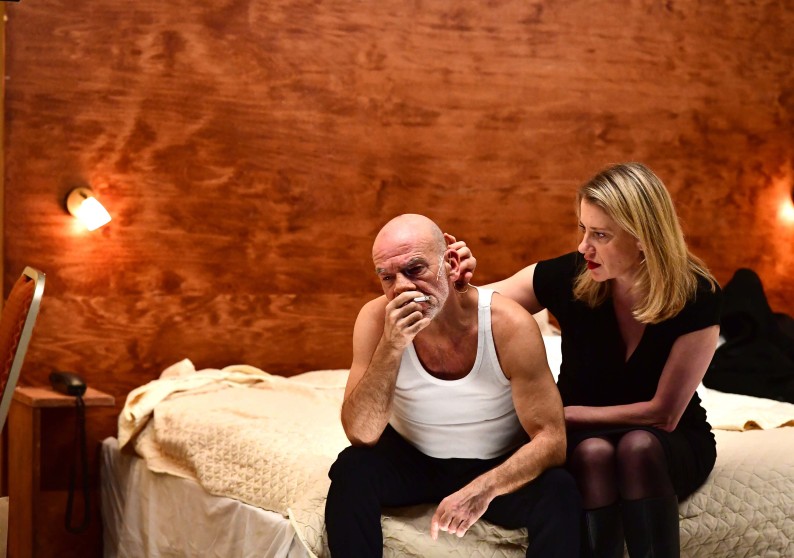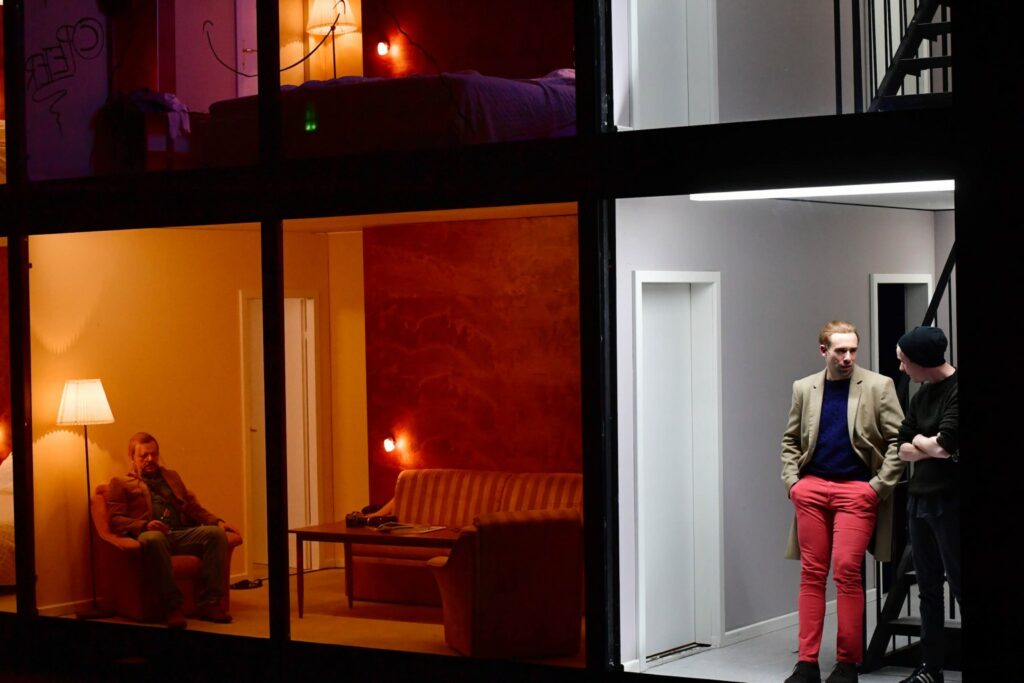Simon Stone’s Theatertreffen opening production of Hotel Strindberg has left our author with one burning question: How on earth could this happen?
Siri, who is Strindberg? –August Strindberg was a Swedish playwright, novelist, misogynist and pa… –Siri, what year is it? 2019.
There are many compelling reasons to introduce a female quota in theatre. Simon Stone’s Hotel Strindberg is one of them. Liberally drawing from the late writer’s fictional and biographical universe without critically reflecting upon his misogynist tendencies, nor convincingly rehabilitating him as an author worthy of celebration in the 21st century poses a simple question: Why?
In purely aesthetic terms, there is little to fault. The play is a technical triumph over three logistically impressive hotel stories. The faint sound of jazzy, late-night trumpets and piano smoothly strings disparate scenes together, crescendoing and retreating entirely at precisely the right moments over the four-hour performance, which itself flows along with ease. The ensemble delivers an energetic, gripping and comic performance as they slip in and out of characters through speedy costume changes, before identities and personas come crashing down on one another in a surreal third act. Such formal elements make it clear why this piece earned itself a seat at this year’s Theatertreffen. Yet there is an obvious if not painful irony in opening the festival with such a production, directly succeeding a speech from Berliner Festspiele Intendant Thomas Oberender that chimed with our feminist zeitgeist, touching on the #MeToo movement, female quotas and the industry’s current incompatibility with family life.
Flaunting digital credentials
So where did it all go wrong? Throughout the performance, toxic masculinity is framed either as humorous or biologically inevitable. Sexist remarks are left unchallenged to stink out the auditorium like stale chauvinist farts while domestic violence is seemingly trivialised. So far, so Strindbergian. But Simon Stone attempts to apply a fresh lick of paint to an otherwise crumbling façade of outdated gender concepts championed by the Swedish author. This is a play set in the here and now, in our technological present, as innumerable references to Netflix, Uber, Facebook and Pornhub make awkwardly clear. Was Silicon Valley a co-producer? While winning some chuckles from older members of the audience, flaunting such digital credentials does little to impress and even less to correct the play’s sexist trajectory, instead raising the question of what exactly transposing vignettes from Strindberg’s world to the present day achieves.

At times, the play offers faint promises of pivotal powerplay moments, although these fail to materialise in disappointing and defeatist anti-climaxes. After an admittedly comical drunken brawl between Caroline Peters and Martin Wuttke, she sends him packing and orders him to pay alimony for their daughter Lara. For a fleeting moment, a woman has been able to take back a sliver of control in this manplay, before his unrelenting aggression leads her to blurt out that Lara is not in fact his daughter and him to trash the hotel room in a fit of masculine rage, shouting “whore” as the curtain closes on the second act. To say such behaviour is glorified by Stone would be wrong, but such scenes lack the appropriate critical framing or feminist remedy to render them meaningful in any kind of progressive, emancipatory theatrical discourse. Unchecked, it transforms the audience into voyeurs in a masochistic spectacle that many audience members won’t feel the necessity to visit a theatre in order to experience.
Recently, I suggested that theatre critics should apply the Bechdel-test in their coverage. In its simplest form, a play would pass the test if two female characters spoke with one another about something other than a man. Hotel Strindberg spectacularly fails even this most basic version. Perhaps that’s befitting of the writer’s sexist legacy? As it happens, Siri was the name of Strindberg’s first wife. He was paranoid she was having an affair with her close friend Marie David. Though his lesbian paranoia ultimately led to their divorce, their unhappy marriage provided him with ample inspiration for his writings. Fast-forward to 2019 and one would be wise to look elsewhere for inspiration if an emancipated, feminist theatre is the goal.
Read a German language review of the same night by our author Antigone Akgün here.
